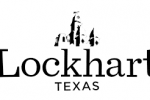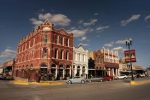Westmoreland claims vacant council seat
By LPR Staff
Editor/POST-REGISTER
With total voter turnout tallying less than eight percent of Caldwell County voters, two emergency service districts were created and Brad Westmoreland claimed a seat on the Lockhart City Council on Saturday.
In a three-way race for the At Large Lockhart City Council seat left vacant by the sudden
and unexpected death of Kenny Roland in January, 639 Lockhart voters made their voices heard as local businessman Brad Westmoreland claimed more than 54 percent of the vote.
Westmoreland, a first time political candidate, earned 349 votes (54.62) percent, to rise to the top of the field.
Lockhart native and accountant Quartermetra Hughes finished the race a distant second, with 188 votes (29.42 percent). Former Lockhart city council member Paul Gomez, who relinquished his seat after 12 years to run for Caldwell County Judge last year rounded out the field with 93 votes (14.55 percent).
Despite dropping out of the race in April, well-known Lockhart resident and former coach Dyral Thomas earned nine votes (1.41 percent), a total that would not have been sufficient to swing the vote in any direction.
Rural voters cast their votes in favor of public safety and increased taxes, as an overwhelming total of voters chose to create Caldwell County Emergency Services Districts 3 and 4.
Caldwell County Emergency Service District #3, in the Martindale area, will encompass the area currently served by the Martindale Volunteer Fire Department, including the property fronting the San Marcos River in the Martindale area.
The initiative to create the ESD passed with 74.65 percent of the vote (53 ballots).
Caldwell County Emergency Service District #4 is the area covered by the Mid-County Volunteer Fire Department, largely between Lockhart and Luling, encompassing some 50 square miles.
That district earned 68 votes to pass, over 11 votes (13.92 percent) against.
Caldwell County Emergency Services District #1 asked voters for an increase in taxes, from one-half of one percent, to 1.5 percent. The increase, which passed voter muster by a tally of 29-17, will exclude all areas where the sales tax is already 2 percent, including the Cities of Buda, Kyle, Niederwald, Uhland and Mustang Ridge.
The City of Martindale will see a change in leadership, as seated mayor Doyle Mosier was ousted by challenger Randy Bunker, who earned 74 votes (51.75 percent).
In addition, Martindale voters chose to create a Municipal Development District, which may, under state statute, collect sales and use taxes, at the rate of one-half of one percent, to fund economic and community development projects.
Other Texas cities with active Municipal Development Districts have used those monies to fund projects such as community and civic centers, auditoriums, etc. While a Municipal Development District may issue bonds, they must adhere to a specific type of projects, which is spelled out thoroughly in the Texas Local Government Code.
Only those voters who live in Martindale’s extraterritorial jurisdiction, but outside the city limits of the City of Martindale, were eligible to vote on the Municipal Development District, and the initiative passed 86-63.
A small election also took place to confirm the creation of Caldwell County Municipal Utility District No. 1, a district which governs the area in rural Caldwell County commonly known as the “Cherryville” development.
Because the results have not yet been canvassed by the board, representatives for Armbrust and Brown, the legal firm overseeing the election, did not release voter totals.
However, the two initiatives on the ballot, confirmation of the creation of the district and an “operation and maintenance tax” not to exceed $1 per $100 of valuation for the property within the district, passed voter muster.
Additionally, the five temporary MUD directors, Joseph Mazola, III, Scott Guesner, Tom Kulik, Larry North and Seth Thatcher, each received one vote to confirm their position as permanent directors.
All voting totals will remain “unofficial” until votes are canvassed by the governing bodies, a process that is expected to take place within the next 10 days.



